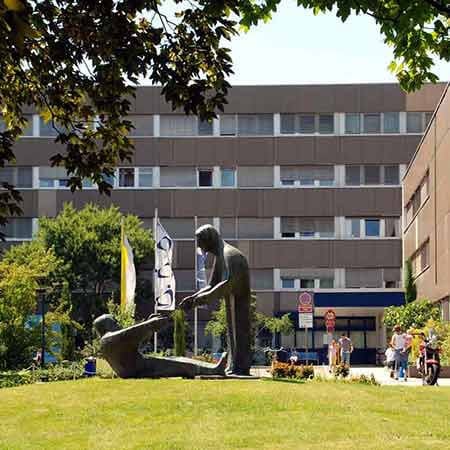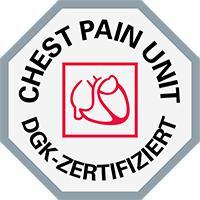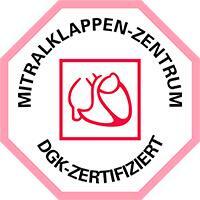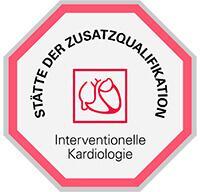One of the disorders of coordinated heart function is sick sinus syndrome. Generalized failure of automatism of the main driver of heart rhythm has very variable symptoms and is quite difficult to diagnose. An only timely visit to a specialist, comprehensive examination, and targeted treatment can significantly improve the prognosis and avoid thromboembolic complications.
Content
- Overview
- Symptoms of the sick sinus syndrome
- Sick sinus syndrome and comorbidities
- The course of sick sinus syndrome
- Treatment of sick sinus syndrome in Europe
- Why undergo treatment of sick sinus syndrome in Europe?
- The cost of treatment in European hospitals
- Treatment with Booking Health
Overview
Despite modern medical achievements, cardiovascular diseases still occupy the leading position in the structure of population mortality. Among the whole cohort of heart diseases, cardiac arrhythmias and conduction abnormalities are the most important problems of cardiology, because they are the first cause of sudden death, which, according to the American Heart Association, accounts for 50% of all deaths from cardiovascular diseases. One of the causes of life-threatening arrhythmias is sick sinus syndrome.
Sick sinus syndrome (SSS) is a complex of heart conditions based on the reduced ability of the sinus node to perform the tasks of the dominant pacing or various variants of impulse conduction impairment. According to the class definition, SSS implies an organic irreversible lesion of the node and the underlying automatic control center, resulting in a decrease in heart rate. Such features as the organic nature of abnormalities of sinus node function, their irreversibility, and affection of the underlying automatic control centers allow distinguishing SSS from vagotonic dysfunction of the sinus node.
The organic origin of conduction system disease requires the earliest possible diagnostics of patients and timely surgical correction to prevent a sudden death syndrome. For example, most countries of Europe, the USA, and Japan have been screening newborns for the last 23 years to identify children at risk of sudden death in infants, schoolchildren, and adolescents involved in sports.
Severe consequences of heart disease development stimulate the intensive study of all links of its etiology and pathogenesis. Taking into account the fact that sinus node dysfunction at the initial stages can be asymptomatic or barely symptomatic, early detection of this heart disease is of particular importance.
That is why the study of genetic predisposition structure to SSS will make it possible to identify persons at high risk of developing this syndrome and optimize both treatment and prevention of complications of this heart condition. Molecular and genetic studies have already confirmed that SSS can be caused by polymorphisms of certain genes. Study of genetic predictors of cardiac arrhythmias and conduction abnormalities, in particular, such a rare and threatened by sudden cardiac death pathology as SSS is undoubtedly relevant. The treatment of such patients and approaches to primary prevention in relatives with pathological gene polymorphisms should be carried out using the principles of personalized medicine.
Symptoms of the sick sinus syndrome
It is important to emphasize that in the early stages of the heart disease development, decreased SC automatism more often leads not to marked bradycardia recorded during nighttime by Holter ECG monitoring, but to the absence of adequate HR increase in response to load, the so-called "chronotropic failure". Probably, it is related to the influence of the compensatory increase of sympathetic activity, which still enables to avoid evident bradycardia, but does not provide any increase of HR during the loads.
Such patients suffer from constant hypertension manifested in rhythm rigidity or the absence of proper heart rate fluctuations during a day, reduced heart rate variability revealed through mathematical analysis methods.
The clinical presentation of the sick sinus syndrome can be transient (in children with inflammatory myocardial diseases), permanent (against the background of congenital heart defects), or progressive (for example, in patients with Romano-Ward syndrome, in cardiomyopathies), but in most cases, the primary lesion of the conduction system is formed. Asymptomatic cases are very difficult to diagnose, when sudden death due to ventricular fibrillation and/or asystole may be the first and the only symptom of heart disease. Therefore, the analysis of the onset of the syndrome symptoms and peculiarities of syndrome detection in children remains relevant.
Regardless of the severity and level of conduction system damage, more than 20% of children with sinus node syndrome are asymptomatic, which requires mandatory electrocardiographic screening. The issue of electrocardiographic screening of newborns is also relevant. In most cases, daily rhythm monitoring by Holter allows revealing abnormalities of conducting system function at different levels. Nevertheless, to differentiate between the functional and organic basis of heart conduction system lesions, it is necessary to perform stress tests. The use of drug tests with atropine or exercise tests allows to eliminate the regulatory influence of the parasympathetic department of the autonomic nervous system and identify patients with sinus node dysfunction. In addition, the stress test can serve as a provocation test specifying the character of cardiac lesions.
Sick sinus syndrome and comorbidities
As a rule, sick sinus syndrome develops in elderly individuals due to sclerodegenerative processes affecting the cardiac conduction system, atherosclerotic (including postinfarction) cardiosclerosis. Electrophysiologically, SSS is manifested by decreased sinus node (SN) automatism function and/or impaired sinoauricular (SA) conduction.
As a rule, sick sinus syndrome requires differential diagnostics with the so-called vagotonic dysfunction, which is based on the increased tone of the parasympathetic department of the vegetative nervous system and/or increased sensitivity to parasympathetic influences. As a rule, such an increase of parasympathetic tone is associated with pathological visceral reflexes and, in most cases, can be eliminated by atropine drugs.
A special type of node dysfunction is carotid sinus syndrome, which is characterized by the development of a pronounced depression of the sinus node (up to arrest), for example, with a mechanical action on the sino-carotid zone. The differential diagnostics of sick sinus syndrome and carotid sinus syndrome requires a comprehensive approach thorough anamnesis, physical examination, ECG registration, dynamic ECG, and several tests and electrophysiological examination with medication denervation.
Cardiac asystole with characteristic clinical symptoms was first described in 1761. Subsequently, these attacks were named Stokes-Adams syndrome attacks as a reflection of cardiac arrest in complete atrioventricular block or other variants of asystole, including sick sinus syndrome.
The etiology of sick sinus syndrome in adults is quite diverse and includes CHD, myocarditis and postmyocardial cardiosclerosis, congenital and involutional degeneration of the specialized heart system, electrical trauma, sinus node artery thrombosis, metastases to the heart due to carcinoma, polycythemia, collagenosis, diabetes, thyrotoxicosis, Friedreich ataxia (muscular dystrophy), and toxic myocardiodystrophy due to domestic exposure to toxic substances.
The course of sick sinus syndrome
In this syndrome, episodes of tachycardia and bradycardia alternate. Immediately after sinus tachycardia, paroxysmal atrial fibrillation at high HR or paroxysmal supraventricular tachycardia, the patient experiences abrupt bradycardia up to sinus node arrest.
Manifestations of SSS can have both pronounced clinical symptoms (if less than 10% of active pacemaker cells remain) and an asymptomatic course. Patients may most often complain of cardiac pain, heart palpitations, recurrent pressure, and compressive heart pain resembling angina pectoris due to decreased blood flow through coronary arteries, hypotension, life-threatening heart rhythm disturbances.
Brain symptomatology occurs due to decreased blood flow in the cerebral vessels and is manifested by such symptoms as dizziness, transient ischemic attacks, impaired concentration, attention, reduced memory, emotional lability. Subsequently, with the prolonged existence of sick sinus syndrome, a feeling of somnolence, fainting state, short-term loss of consciousness (Stokes-Adams attacks) associated with a sharp deterioration of blood supply to the brain becomes characteristic. Deterioration of blood supply also occurs in other organ systems, leading to corresponding disorders (renal failure, heart failure, decreased muscle tone, and digestive tract disorders).
Today, the most accessible and frequently used method of diagnosis is daily ECG monitoring. The clinical practice also involves the use of the diagnostics of neuroregulatory influence and electrophysiological methods with an estimation of parameters of time of restoration of sinus node function. The results of these diagnostic tests help establish the exact diagnosis and indications for implantation of a permanent pacemaker, which is a method of choice for treatment in patients with SSS.
Treatment of sick sinus syndrome in Europe
Non-drug treatment of patients with sick sinus syndrome includes standard dietary and lifestyle recommendations. In addition, it is necessary to cancel drugs (if possible) that may have caused or aggravated the health condition (for example, beta-adrenoblockers, slow calcium channel blockers, certain groups of antiarrhythmic drugs).
Drug therapy options for the treatment of the syndrome are limited. The therapy for the disease that caused the onset of the health condition is carried out according to the general rules. In emergency cases, with pronounced sinus bradycardia, and worsening of hemodynamics, atropine solution is injected intravenously. In the case of Stokes-Adams syndrome with seizure development, resuscitation measures are required.
However, when using certain drugs, it is necessary to remember the danger of provocation of rhythm disturbances. The therapy of concomitant tachyarrhythmias should be performed with great caution. Almost all modern antiarrhythmic drugs have an inhibitory effect on sinus node function.
For pathology occurring because of the vagal irregularities, unlike sick sinus syndrome caused by organic impairment, conservative therapy is of special importance. The therapy for heart disease is performed according to general principles, including measures of cessation of parasympathetic influence on the heart, modified physical activity, and rational psychotherapy.
If patients experience night apnea syndrome, with adequate treatment of the heart disease, the disappearance or relief of symptoms is usually noticed.
The indications for pacemaker implantation as the main surgical technique for organic syndrome include:
- Sinus node syndrome with documented bradycardia or pauses accompanied by symptoms, including those resulting from therapy that cannot be reversed or replaced.
- A diagnosis with a low heart rate and clinical symptoms under the condition that the symptoms are not due to bradycardia specifically.
- Syncope for unclear reasons detected on electrophysiological examination.
- Minimally expressed symptoms with a waking heart rate of less than 40 bpm.
Why undergo treatment of sick sinus syndrome in Europe?
The European health care system has repeatedly been recognized by experts as one of the most effective in the world. Thanks to the use of revolutionary methods and technologies, the physicians working in European hospitals have achieved brilliant results in the diagnosis and treatment of many heart diseases, including heart failure. Besides, European scientists regularly report important discoveries in various fields of medicine, specifically regarding heart pathologies. But when choosing the clinic for treatment it is important to pick from the specialized medical facilities.
European hospitals are the most common treatment destination for patients with sick sinus syndrome.
Contact Booking Health if you need help in picking the hospital for heart disease treatment. More information about the mentioned European hospitals can be found in the hospital section of the Booking Health website.
The cost of treatment in European hospitals
It cannot be stated that the cost of treatment in Europe is too high. The level of prices in Europe can be considered moderate. The prices are lower than in the United States. The quality and efficiency of medical services provided by European hospitals fully justify the cost of treatment, so it does not become a disadvantage, because of which the patient with heart disease would look for a clinic in another part of the world.
The cost of treatment in Europe can be obtained after reviewing the medical records of patients. Depending on the medical institution, prices may vary by 10-20% max. The cost of treatment, however, will be drawn up in detail separated by the prices for treatment components, including a visit to the doctor, diagnostic procedures, conservative and surgical treatment. A person can immediately roughly determine the figure of interest, compare the total cost of treatment in Europe and other places and make a decision.
Booking Health can draw up a preliminary cost of treatment for your heart condition. All you need to do is fill in the request form on the Booking Health website and a medical advisor will contact you as soon as possible.
Treatment with Booking Health
Booking Health fully organizes your treatment trip to the clinic and solves all organizational and administrative issues.
Booking Heath coordinates the terms of the examination or treatment with the clinic, obtains an official invitation for a visa and helps to arrange visa documents, arranges medical insurance, books airfare, and comfortable accommodation, if the treatment abroad takes place without hospitalization, taking into account all nuances and all needs of our clients. We draw up an individual program for a client where we describe all stages of stay abroad in detail.
To start your treatment in Europe, please leave your request on the Booking Health website.
Authors: Dr. Nadezhda Ivanisova, Dr. Sergey Pashchenko


















